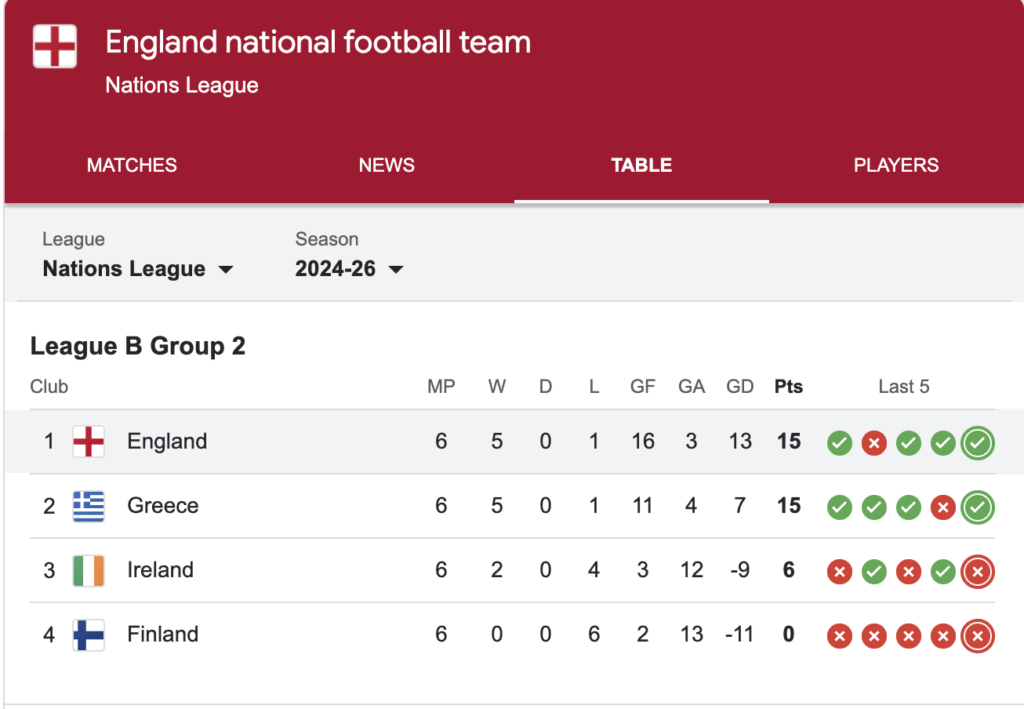The England national football team represents England in international competition and is known by its three lions symbol. The team competes at FIFA World Cups, Euro Championships and other tournaments around the globe.
Sven-Goran Eriksson served as their first non-English manager between 2001 and 2006. Following that stint, Gareth Southgate was appointed coach in November 2016, leading them to their best ever performance at an international tournament (Cup of Nations 2024).
| Category | Details |
|---|---|
| Team Name | England National Football Team |
| Nickname(s) | The Three Lions |
| Governing Body | The Football Association (The FA) |
| Confederation | UEFA (Europe) |
| FIFA Code | ENG |
| Home Stadium | Wembley Stadium (London, England) |
| Stadium Capacity | 90,000 |
| Head Coach | Gareth Southgate (as of 2025) |
| Captain | Harry Kane |
| Most Caps | Peter Shilton – 125 caps |
| Top Scorer | Harry Kane – 63+ goals |
| FIFA Ranking (October 2025) | 4th (approximate) |
| First International Match | vs Scotland – 30 November 1872 (0–0 draw) |
| Biggest Win | 13–0 vs Ireland (1882) |
| Biggest Defeat | 1–7 vs Hungary (1954) |
| World Cup Appearances | 16 |
| First World Cup Appearance | 1950 |
| Best World Cup Result | Champions (1966) |
| UEFA European Championship Appearances | 11 |
| Best Euro Result | Runners-up (2020) |
| Recent Major Tournament | UEFA Euro 2024 – Quarter-finals |
| Team Colors | Home: White shirt, navy shorts; Away: Red shirt, white shorts |
| Official Website | www.thefa.com/england |
In this article, we will discuss the high lights and main points of England National Football Team Standings.
England have won the World Cup three times
The England national football team represents England internationally in men’s association football. Governed by the Football Association and affiliated with UEFA, it competes in three major tournaments that test European national teams: FIFA World CupTM, European ChampionshipTM and Nations LeagueTM.
England have won three World Cup tournaments, most famously in 1966 when Geoff Hurst scored a hat-trick to help secure a 4-2 victory against West Germany in the final. This remains their sole World Cup victory to date.
England had struggled in 1998 at FIFA World Cup but managed to reach the semi-finals at UEFA Euro 2004 under manager Fabio Capello, where they defeated Ukraine and then Croatia before reaching the final before losing on penalties to Italy.
At the 2002 World Cup, England were led by Sven-Goran Eriksson to reach the quarter-finals, losing out only five competitive matches under him during four years – an outstanding achievement which restored national pride.
England had similar fortunes in 2006 at their next World Cup appearance, reaching the semi-finals before succumbing to Brazil on penalties in the semis. England did not qualify for either of the 1974 or 1978 tournaments, leading to Alf Ramsey being removed as manager; Ron Greenwood led England back onto qualification for South American World Cup tournament, only to see them eliminated early by reigning champion Brazil in quarter finals.
England have officially qualified for the 2024 World Cup under interim manager Lee Carsley and former Chelsea and Bayern Munich manager Thomas Tuchel as permanent coach, and look strong for this tournament with Thomas Tuchel taking charge on a permanent basis. Their squad was impressive during recent matches such as drawing against Ireland and beating Republic of Belarus during UEFA Nations League play – they will hope to take one step further at March’s World Cup tournament!
They have won the UEFA European Championship once
The UEFA European Championship, more commonly referred to as Euros, is an international football tournament held every four years in Europe. Consisting of 24 teams from across Europe, its winner receives the coveted trophy. England has participated in every Euros event to date; reaching two semi-finals and three quarter-finals before going down in 1966 World Cup under manager Alf Ramsey as champions.
Since then, England has struggled to reach the summit of tournament. Their worst performance came at the 2014 World Cup when they managed just one point from three matches and were then defeated in a penalty shootout against Costa Rica, leading Roy Hodgson to step down as manager.
At Euros, France have suffered due to changing rules. For the first two tournaments, teams earned points based on how they performed both home and away matches; after 1968 tournament, qualification took place through group play alone.
England last competed at an international tournament in 2016, when competition expanded from 16 to 24 teams. They finished top of their group before losing in a quarter-final penalty shootout to Italy; nevertheless, fans remain hopeful that current players will show improvement at future competitions.
However, there is no direct correlation between a country’s success in international tournaments and its domestic league quality. Although an outstanding league can certainly contribute, other factors will determine a country’s fate, such as having enough talented players competing for spots on national teams as well as its level of organization among clubs.
Gareth Southgate’s England will face Spain in the Euro 2024 final at Berlin’s Olympiastadion, and is predicted to be an exciting contest.
They have qualified for the FIFA World Cup 16 times
England have qualified for 16 FIFA World Cup tournaments, tied for sixth best among Brazil and Italy. First appearing at the tournament in 1950, England have since competed in 16 events including two fourth-place finishes at 1990 and 2018.
England achieved their greatest triumph in 1966 when they defeated West Germany 4-2 in the final to claim their maiden World Cup victory at home ground. Geoff Hurst, Bobby Charlton and Gordon Banks comprised an arguably formidable English side that took part.
After their success in 1966, England struggled for consistency and were unable to make it past the quarter-finals at subsequent World Cups. Following their defeat by Uruguay at the 1974 tournament – leading to Don Revie being fired as manager – England failed to qualify for either 1978 or 1980 World Cups despite having players like Trevor Brooking and Kevin Keegan on their squads; although under new manager Ron Greenwood they enjoyed more success at 1982 reaching the second group stage for the first time since 1962!
England defeated Tunisia 2-0 during group stages thanks to goals scored by Alan Shearer and Paul Scholes, but then fell 2-1 to Romania due to Dan Petrescu’s late winner against them in injury time. They were later knocked out of contention by Italy during third-place play-off after drawing 1-1 in regulation time; ultimately losing on penalties following 1-1 draw.
At Euro 2012, England were led by Roy Hodgson who took over for Fabio Capello. Unfortunately, Hodgson failed to replicate Capello’s success and their group finished last with three defeats and one draw; shortly afterwards he tendered his resignation while Sam Allardyce was appointed his replacement manager.
At the 2014 World Cup, England were eliminated in the opening round for only the third time since 1958. They drew 2-2 against Iceland and were booed off the field after failing to score during extra time, in what has been widely described as one of England’s worst performances ever.
They have won the UEFA Nations League twice
UEFA Nations League continues to gain in popularity as it serves as an alternative to meaningless friendly matches and provides teams with the chance to compete in an internationally competitive tournament featuring promotion and relegation. This tournament has proven especially vital for England as they were twice relegated in recent years, so need to improve results quickly to remain in top flight competition. It has also improved squad quality by giving players valuable playing experience.
The Three Lions have currently fallen to fourth in Group B with six points, just behind Greece and Republic of Ireland who both possess four. Interim manager Lee Carsley boasts a talented squad but will miss several key players due to injuries; new permanent manager Thomas Tuchel won’t join until January.
As England prepares for no major tournament next summer, the Nations League may serve as an effective stepping-stone competition. It offers teams an unprecedented chance of victory by being divided into groups and leagues according to their ranking – giving each side more chances to advance and reach the finals.
This year’s tournament is particularly thrilling, as it will include a revamped knockout round which gives England an opportunity to taste success and gain experience winning finals matches.
On Thursday at Wembley Stadium, England will face Greece for their second UEFA Nations League match of the season. Their home record against their opponent has been impressive while away form has been less so; England hopes that winning in Athens may improve this.
England took an early lead as Tino Livramento’s deflected cross from Newcastle teammate Anthony Gordon was met by Tino Livramento’s deflection, with Anthony Gordon scoring his inaugural international goal on his volley shot. Soon thereafter Manchester City defender Kyle Walker scored with his header off of a Marc Guehi corner before Spurs midfielder Dominic Solanke completed it all with an acrobatic finish for England to go 3-0 up.
Jack Grealish was sent off after receiving a red card, leaving England down to 10 men for much of the second half, but still managed to score late goal when Jordan Henderson, then playing through from Carsley’s pass, turned in loose ball from Carsley into goal and scored.
Also Read:


